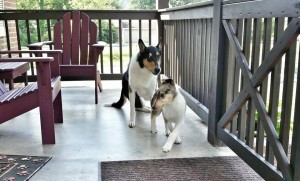From the Frying Pan into the Fire: Adding a Dog When Your Current Dog Has Issues
Let’s say for the sake of argument that you have a human child who is difficult, with a personality disorder that needs professionally addressed. Yet you haven’t had the heart to take that step. Your child is antisocial towards everyone but your own family, and at times, including them. He is disruptive in school, openly hostile and pro-active about avoiding interactions while generally challenging any form of authority. Would you think it a good idea to suddenly decide to adopt another younger child to shower with affection? Would you expect the interactions of the new child and the troubled child to go smoothly?
Strangely, many people do exactly the canine equivalent of this. They are then vastly surprised that they have a problem on their hands. The expectation is that if you have two of the same species in the house, they should automatically get along. Why? All humans don’t get along. It would, of course, be great if that were the case, but humanity has a long way to go before we get to that point.
No one understands more than I do the temptation to add another canine to one’s household. But even I did not reach this point without planning. My last ‘singleton’ dog was adamant about remaining a singleton. I tried but at that stage of my training life, I was not skilled enough to ‘fix’ her. Layla’s behavior nearby other dogs in public was fine. I ‘fixed’ that very easily. She simply did not want to share her personal space with another canine and I grudgingly respected that. She had no other issues. She was a delightful and charming dog, enchanting every human she met. Everyone loved her and she them.
Adding another canine to a household with a dog who not only dislikes other dogs but also most humans, is a huge task to take on. Modifying that behavior won’t happen overnight. There are no magic wands. Consistency and parental boundaries are important. Because of my specialty, I get requests to help with such situations. I believe being truthful is important to achieving success. All family members must be on board in order for quality changes to take place. Realistic expectations are crucial and patience is key.
Managing the environment and setting each dog up for success is important. I often get asked, “How do I stop so and so from annoying so and so?” Easy, don’t let him do it in the first place. Setting up your household structure so that each dog feels safe and secure is important to success. Safety is high on the hierarchy of needs. Anxiety is off the charts without safety. The humans are in charge of safety. The dogs need structure, guidelines and safety. Reinforcing for appropriate choices and providing an incentive for such, helps to teach impulse control.
My job would be so much easier if simply integrating the dogs was my only requested task. Yet in so many of these cases, the resident dog in question *also* dislikes all human strangers so that has to be addressed before I can even attend to attempt to address the dog/dog situation. I do have to get access to the inside of the house, after all! (Edited to add in 2022: obviously, now I can offer virtual sessions for such and in many cases, that is indeed the better option. But honestly, in many cases that also means that I miss demonstrating some small things that can mean the difference between success and failure.)
In the worst scenarios, the owners have waited until the now larger and more confident dog has gotten fed up with the corrections he or she has endured at the paws of the other dog and has started to fight back. Get help before this point, please! Better yet, address your original dog’s issues FIRST, before you add gasoline to your fire. The amount of work that needs done once the deed is done is more than most people want to deal with. So do yourself a favor and think of what the resident dog needs rather than what you want.
If you lived through such a scenario, feel free to tell us all about it in the spaces below.
Posted in: Projects
Leave a Comment (1) →

